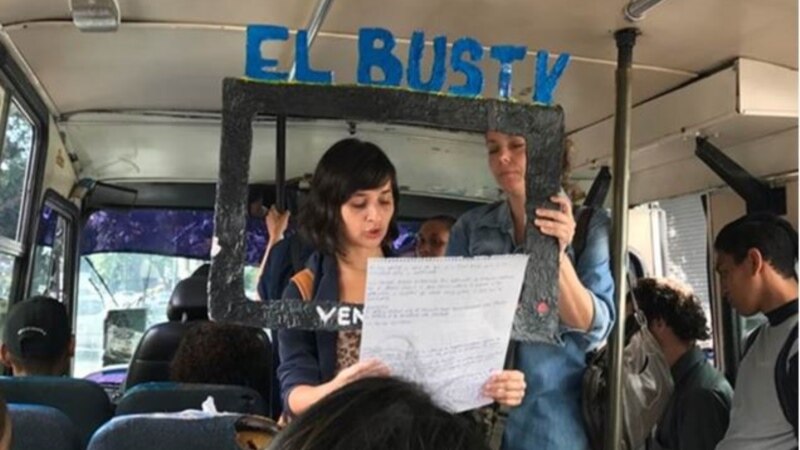Quest for Unbiased Information Drives Venezuela's El Bus TV

Claudia Lizardo and her boyfriend were riding a public bus in Venezuela's capital city one day in spring when the vehicle passed an anti-government demonstration, with people running from security forces amid clouds of tear gas.
"There was a lot of anguish in the street," recalled Lizardo, a 29-year-old creative director for a digital content studio. But she was troubled that other riders seemed impassive. "The people ... were completely isolated."
Or, maybe they weren't sufficiently aware, she and several others surmised in deciding to address possible information gaps via a truly mobile news platform, El Bus TV. Now, they and imitators elsewhere in Venezuela are boarding public buses, delivering news bulletins while framing their faces with cardboard TV screens.
Getting impartial information can be a challenge in Venezuela, where journalists operate in a restrictive environment, legacy news operations promote government views, and at least half the country's 31 million people lack internet access to seek information on their own.
Venezuela's socialist government began clamping down on independent news media after Hugo Chavez came to power in 1992, according to the U.S.-based website Nieman Reports, and Nicolas Maduro continued the practice when he became president in 2014.
Nieman provided an accounting as of early June: "... Five television channels have been closed and nine removed from cable television subscription services; 62 radio stations have gone off the air because of official prohibitions; and the government has fined media outlets 32 times." That has created an atmosphere of intimidation, censorship and self-censorship among some media outlets, Nieman observed.
Though she personally opposes Maduro's policies, Lizardo said she and her colleagues strive to present even-handed, fact-based reports in buses predominantly serving poor neighborhoods. She spoke with VOA last week about El Bus TV in an interview edited for length and clarity.
VOA: Who operates El Bus TV?
Lizardo: Long-time journalist Laura Castillo is a co-founder. We teamed up to give more journalistic structure to El Bus TV, which is basically a mobile television newscast.
Laura and I decided that we would go out on the street on May 27, the 10th anniversary of the closing of Radio Caracas Televisión, a very important channel for Venezuelans. We met with four friends in communications: MarÃa Gabriela Fernández, VÃctor RodrÃguez, Nicolás Manzano and Abril MejÃa. We've been doing this as honestly as we can. There have been replicas throughout the country, with about 50 people participating.
How do riders respond to El Bus TV?
It is rather strange that a group of people should raise a cardboard frame to tell news on a bus, so we try to do it with the greatest respect and the greatest [commitment to] truth and balance. People have reacted marvelously -- 90 to 95 percent of the time, they applaud at the end of the "broadcast."
Some people do not agree with certain information; then there are debates. If someone raises an opinion, another passenger responds and the team is not part of this debate. Bus TV raises the news, both sides of the coin, with statements from both parties.
Often, drivers do not want to charge us [bus fare].
How frequently does El Bus TV deliver the news?
This has been changing and growing. We originals all have jobs from 9 to 6, so we have been doing this activity in our spare time. We don't do breaking news. The original group usually goes out twice a week, the other teams that have been replicating us do it when they can. There are many students.
Has there been any trouble â€" theft or violence â€" against you or other passengers when El Bus TV delivers the news?
Not yet, thank God. We board a bus with a team of five people, not just two, making it more complicated to steal from us.
How do you feel about informing the public during these difficult times in Venezuela?
It's emotional. It was traditional for Venezuelans to have access to simple and truthful information. In that sense, we are returning a little to the roots of journalism â€" to pure, direct journalism. Contact with people is extremely important to us.
We are completely independent, [we] do not respond to the interests of any party or political personality. This is a serious journalistic exercise to really give the news in a balanced way. ... We haven't gotten any negative reaction from the government.

0 Response to "Quest for Unbiased Information Drives Venezuela's El Bus TV"
Posting Komentar